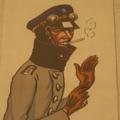Murf quoted Humankind by Rudger Bregman
There is a persistent myth that by their very nature humans are selfish, aggressive and quick to panic. It’s what Dutch biologist Frans de Waal likes to call veneer theory: the notion that civilisation is nothing more than a thin veneer that will crack at the merest provocation.4 In actuality, the opposite is true. It’s when crisis hits – when the bombs fall or the floodwaters rise – that we humans become our best selves. [..] Catastrophes bring out the best in people. I know of no other sociological finding that’s backed by so much solid evidence that’s so blithely ignored. The picture we’re fed by the media is consistently the opposite of what happens when disaster strikes. [..] ‘My own impression,’ writes Rebecca Solnit, whose book A Paradise Built in Hell (2009) gives a masterful account of Katrina’s aftermath, ‘is that elite panic comes from powerful people who see all humanity in their own image.’14 Dictators and despots, governors and generals – they all too often resort to brute force to prevent scenarios that exist only in their own heads, on the assumption that the average Joe is ruled by self-interest, just like them.
— Humankind by Rudger Bregman (Page 6)










